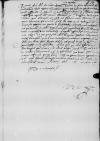Letter #1840
Ioannes DANTISCUS to Tiedemann GIESEHeilsberg (Lidzbark Warmiński), 1538-03-21
English register:
Dantiscus is taking advantage of the opportunity provided by the return of the Provost [Paweł Płotowski to Frauenburg (Frombork)] to announce that a member of the Gdańsk (Danzig) Town Council, Doctor Ioannes Tresler, has convinced him to postpone the case of the beer duties until the next Diet [of Royal Prussia], unless complaints from his subjects incline Dantiscus to intervene with the King (Sigismund I Jagiellon]. Dantiscus declares that as a guardian of common privileges and the interests of his homeland [Royal Prussia], he will no longer tolerate this lawlessness and will not neglect his responsibilities in the matter. The addressee will soon be obliged to do the same.
The matters discussed with the Provost will probably be recounted by him.
Dantiscus recommends patience to Giese regarding matters in Rome.
| received [1538]-03-23 Manuscript sources:
Prints:
| ||||||
Text & apparatus & commentary Plain text Text & commentary Text & apparatus
Reverendissimo Domino
Reverendissime Domine, frater et amice carissime ac honorande.
Salutem et fraterni amoris commendationem.
Non potui committere, quin iis, habita oportunitate domini
Alia, quae cum domino
Quod adhuc in
Dominationem Vestram Reverendissimam felicissime valere fraterno animo cupio.
Ex
Reverendissimae Dominationis Vestrae integerrimus frater

